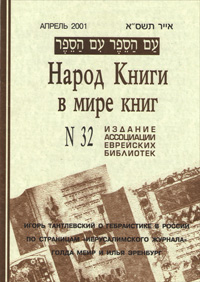The People of the Book in the World of Books is a Russian bimonthly publication for serious readers with Jewish interests. Our English website includes only the summaries of the published articles. To access the complete text of them, please visit the Russian version of this website.

|
||
|
This issue of the magazine includes:
• Interview: Igor Tantlevsky, Director of the Center for Biblical and Hebraic Studies at the St. Petersburg State University
Professor Igor Tantlevsky is the author of Introduction to Pentateuch, the first scientific introduction to the Torah in Russian, published in Moscow in 2000. In the interview he expresses his views on the current state of Hebraic studies in Russia and prospects for future developments.
• Review: Unfinished Concert for Guitar and Voice
The Jewish theme started to resound in Russian "author's songs" in the 1960s—as a forbidden, "dissident" tone, together with subjects such as of freedom of speech, human rights, and Stalin's repressions. The book The Concert Begins..., dedicated to the Jewish element in Russian "author's songs", was published by the Jewish Community Center of St. Petersburg in 2000. The magazine's reviewer stresses that the book is the first attempt to present the Jewish component of this very special genre of Russian poetry and expresses the hope that "the concert will continue".
• Survey: Jerusalem Magazine, a New Russian-Language Edition in Israel
The first issue of Jerusalem Magazine appeared in 1999. Its editorial article announced that this new publication will be dedicated mostly to modern Israeli literature in Russian. The reviewer analyzes the first four issues of Jerusalem Magazine.
• Polemics: Golda Meir and Ilya Erenburg—Two Symbols of Jewry
Disputes around the controversial personality of Soviet writer Ilya Erenburg (1891–1967) still continue even today. In his article, Moscow journalist Mikhail Gorelik argues with St. Petersburg literary scholar Boris Frezinsky, whose interview was published in the previous issue of the magazine. According to Mikhail Gorelik, Erenburg's ardent struggle with anti-Semitism was a struggle for freedom of assimilation. Erenburg's position contrasted with that of Golda Meir, who represented postwar Soviet Jews' aspirations for national liberation.
• Exchange of Experience: Programs for Children in the Odessa Jewish Library
• Jewish Calendar of Significant Dates: May–June 2001
• Bibliography: 55 New Books |


